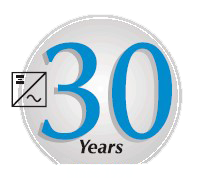If this is your first time buying an inverter, you might get confused with the many options available. And as a novice, you may think that industrial and commercial inverters are alike; but they aren’t.
Both these inverters differ in their functions and other features. You can find below the marked differences between industrial and commercial inverters.
What are industrial and commercial power inverters?
Industrial inverters are high-power equipment that helps power massive industrial instruments during power failures, outrage, or power cuts.
Commercial inverters are power backup systems that help power sophisticated, lighter, and expensive equipment that requires less power supply. They are better for comparatively lighter appliances like running air conditioners, medical equipment, etc.,
Why choose industrial power inverters?
An industrial inverter provides an uninterrupted power supply to critical industrial equipment during power cuts.
Moreover, they can provide powers for a longer time during complex industrial operations like production, manufacturing, etc.
Where should you purchase the inverters?
It is your choice to purchase them directly from the manufacturers or vendors. However, buying inverters from manufacturers offer the following benefits:
- You get the inverter at the best price because there is no price margin for the vendor.
- Many vendors do not have all the manufacturers’ products, which means you get less variety from the vendors.
- The manufactures have more knowledge of their products than vendors.
Life-span and the price tag of industrial inverters
Inverters that are well maintained and taken care of can last for ten years or more.
However, the lifespan may vary from one manufacturer to another. Therefore, it is advisable to confirm the lifespan with the manufacturer before you purchase your industrial inverters.
Difference between industrial inverters and commercial inverters
Here are some scales to understand the difference between commercial and industrial inverters in a better way:
1. Life span
Industrial power inverters generally have a longer lifespan than commercial inverters. If installed properly and maintained regularly, they yield better and longer output for decades.
However, commercial inverters have a shorter lifespan when compared to industrial inverters.
2. The Load Capacity
It is an essential criterion to differentiate between industrial and commercial inverters.
The load-carrying capacity of industrial inverters is better than that of commercial inverters. They carry a higher energy load needed to run heavy industrial appliances.
On the contrary, commercial inverters meet home appliances’ power requirement that needs far less power. Besides, commercial inverters start malfunctioning, and their performance deteriorates when forced to work more than their capacity.
3. NEBS level 3 Certificate
The NEBS Level 3 certificate, attached to industrial inverters, ensures the durability and reliability of industrial inverters.
It provides the highest level of protection against heavy vibrations, temperature variation, etc.
On the contrary, commercial inverters stop working under such extreme conditions.
4. Customized Solution
Customized industrial inverters ensure the best performance even in harsh environmental conditions.
They meet your specific power requirements and are this highly efficient, reliable, and require minimal repair time.
In contrast, commercial inverters lack this customization option.
5. Housing
Though tightly sealed and rigid compared to commercial inverters, industrial inverters are prone to damage from heavy falling objects and adverse elements.
On the other hand, the inside mechanism of inverters is more likely to end up damaged if mishandled.
If you are looking to purchase commercial or industrial power inverters, Exeltech is the right place for you. We offer various models of inverters like custom and stock models to fulfill the requirements of all consumers. You can dial us at (800) 886-4683 to inquire about different inverters models and our services.




